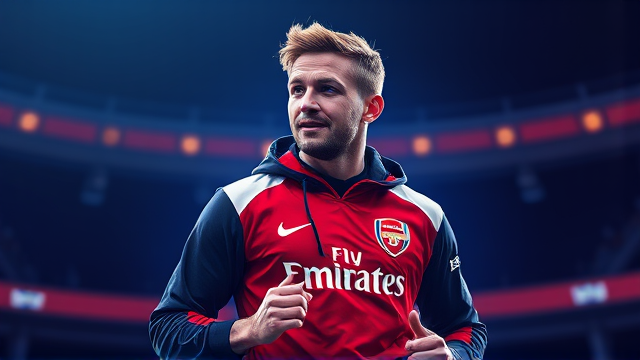From teen star to manager at 33 - Wilshere's journey
The arc of a footballing career rarely follows a predictable trajectory, but few have experienced the dramatic pendulum swing from teenage prodigy to managerial prospect quite like Jack Wilshere, whose appointment as Luton Town manager at just 33 feels less like a career change and more like a destiny fulfilled. Wilshere, who famously made his Arsenal debut at 16 years and 256 days, was the embodiment of a wonderkid, a midfielder with a low centre of gravity and a preternatural footballing brain that saw him dominate the vaunted Barcelona midfield in the Champions League, drawing immediate and perhaps premature comparisons to English legends like Paul Gascoigne.His career, however, became a masterclass in resilience, a brutal lesson in how physical frailty can undermine generational talent; a broken ankle in 2011 sparked a cascade of injuries that saw him miss a staggering 151 games for Arsenal over five years, a period where his potential was measured more in minutes on the treatment table than moments of magic on the pitch. By 25, a surgeon delivered the chilling prognosis that his playing days might be over, yet he defiantly battled on to accumulate 197 appearances for the Gunners, lifting two FA Cups and earning 34 England caps, a testament to a fighting spirit that now seems the perfect foundation for management.His subsequent spells at Bournemouth, West Ham, and a brief swansong in Denmark with AGF Aarhus before retirement at 30 were a slow, graceful descent from the pinnacle, but they provided a gritty, real-world education far removed from the Emirates’ rarefied air. The question, then, is not why Wilshere has chosen management, but why it has chosen him so soon, and the answer lies in a football intellect that was obvious to teammates like Paul Robinson at Bolton a decade ago, who noted how a teenage Wilshere would dictate play and demand positional changes like a seasoned veteran, his mind constantly dissecting the game’s geometry.This intellectual curiosity was honed by seeking counsel from Mikel Arteta, a figure whose own transition from Arsenal captain to transformative manager provides a compelling blueprint; Arteta’s advice to 'jump in and swim as hard as you can' resonates deeply, mirroring the Spaniard’s own baptism by fire at a fractured Arsenal, a challenge not entirely dissimilar to the one Wilshere now faces at a Luton side tumbling from the Premier League to League One via successive relegations. The Hatters, currently 11th and five points off the play-offs, represent a monumental rebuilding project, and the club’s decision to choose Wilshere over proven operators like Leyton Orient’s Richie Wellens—who boasts two promotions on his CV—signals a bold bet on potential and philosophy over immediate, pragmatic results.Crucially, Wilshere does not arrive alone; the appointment of Chris Powell, a former Charlton manager with experience across all four professional divisions, as his assistant is a masterstroke, providing the steadying, experienced hand that will be vital in navigating the relentless grind of a League One season. Wilshere’s coaching apprenticeship, though brief, was intentionally comprehensive, beginning with Arsenal’s Under-18s where he quickly shed the notion that being a good player automatically makes a good coach, a humbling realisation that informed his patient climb through Norwich City’s first-team setup, which included a two-game caretaker stint that solidified his belief that he was ready for the top job.His philosophical roots are unmistakably Arsenal, shaped by Arsène Wenger’s devotion to possession and Arteta’s structured control, but he is keen to forge his own identity, echoing the old footballing adage that you must 'earn the right' to play, a principle that will be tested immediately against the physical demands of England’s third tier. In a landscape increasingly populated by young managers like Brighton’s Fabian Hurzeler, Wilshere’s appointment is part of a broader trend, yet his unique journey—from eight-year-old Luton hopeful to global star and now back as the club’s leader—imbues it with a profound narrative weight. He is not trading on his famous past; he is, as he insists, a 'new Jack Wilshere, a different Jack Wilshere,' one whose hunger, forged in the crucible of adversity, is now directed not at winning personal duels, but at building a team, a culture, and a future for a club returning to its prodigal son.
Latest News
In a move that perfectly encapsulates the delightful unpredictability of modern football culture, Russian national team and Dynamo Moscow manager Valery Karpin
32 minutes ago1 comments
The tectonic plates of European football are set to shift once more, with UEFA and the European Club Association's joint venture, UC3, announcing a seismic
37 minutes ago0 comments
In a stunning revelation that cuts to the very heart of the global MMA landscape, the legendary Fedor Emelianenko has pulled back the curtain on the UFC's
47 minutes ago0 comments
The Kontinental Hockey League served up a fascinating slate of action on October 13th, with two compelling fixtures that underscored the relentless, grinding
57 minutes ago0 comments
The upcoming United States Grand Prix in Austin is bracing for a formidable opponent that has nothing to do with aerodynamic downforce or power unit modes: an
1 hour ago1 comments
In a clash that had all the dramatic tension of a classic playoff encounter, Severstal carved out a piece of Kontinental Hockey League history, notching their
1 hour ago0 comments
The trajectory of Brenden 'Butterbean' Queen’s stock car career is a masterclass in seizing opportunity, a narrative arc that saw its latest dramatic turn with
2 hours ago2 comments
The Tennessee Titans' decision to fire head coach Brian Callahan represents a stark statistical failure in the NFL's modern coaching landscape, a move
2 hours ago0 comments
It’s quiet here...Start the conversation by leaving the first comment.
